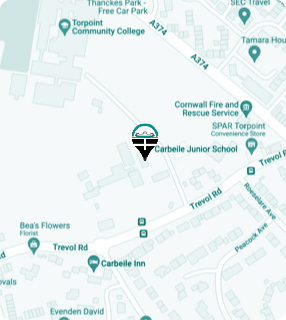Dyslexia Support at Carbeile Junior School
What is dyslexia?
Dyslexia is a learning difficulty that primarily affects the skills involved in accurate and fluent word reading and spelling.
It affects a range of intellectual abilities. There are many famous and very successful people including Richard Branson, Tom Cruise, Pablo Picasso, Albert Einstein, Leonardo Da Vinci who have strong dyslexic traits.
Those with dyslexic traits may have difficulties in the following areas:
- Visual Stress
- Auditory difficulties
- Speech and Language difficulties
- Phonological awareness
- Working Memory
- Processing of information
Dyslexia is best thought of as a continuum, not a distinct category as there are no clear cut off points
Indicators of Dyslexia
Dyslexic children may exhibit the following traits…
General
Pupils may ….
- Appear intelligent and articulate but unable to read and/or write at the expected level.
- Present with poor learning behaviours.
- Not wish to challenge themselves.
- Dislike reading and/or writing.
- Respond well to practical experiences.
Vision, Reading and Spelling
Pupils may ….
- Be confused by letters, numbers and words.
- When reading or writing show repetitions, additions, omissions, substitutions, reversals ( with letters, letter sequences, and/or numbers).
- Read and re-read with little comprehension.
- Spell phonetically and inconsistently.
- Be slow to process visual information or process inaccurately.
Visual Stress
Some dyslexics have difficulty reading because of visual stress. With visual stress letters may appear blurred, can move around the page, double up and/or appear to shake.
Possible indicators of visual stress ….
- Reading is very slow. Pupils suffer from headaches after reading for a sustained period.
- Complains of problems with eye sight but basic eye tests do not identify any issues.
- Pupils will jump across lines or miss out words.
- They are methodical in tracking, requiring their fingers or a ruler to keep their place on the page.
- Their reading greatly improves when they use a coloured over lay.
Hearing, Speech and Phonological awareness
Pupils may ….
- Have difficulty putting thought into words, speaking in halted phrases, sentences left incomplete, stutters under stress, mispronounce long words.
- Be slow to process auditory information.
Phonological Awareness
Phonological awareness is the conscious awareness of the sounds of language. It is an ability to reflect upon the sounds in words and that the sounds that make up spoken language can be broken down into smaller segments.
Phonological awareness is seen as the most important element of literacy acquisition and should be achieved at an early stage before the process of reading and writing begins.
Indicators of poor Phonological awareness –
- Unable to identify syllables in a word.
- Struggle to name beginning, middle or end sounds in a word.
- Have difficulties identifying rhyming words.
- Struggle to blend sounds.
Memory and Cognition
Pupils may ….
- Have an excellent long term memory for experiences, locations and faces.
- Have a poor memory for events and learning that has not been experienced first-hand.
- Think primarily with images and feelings and not sounds and words (has little internal dialogue).
Working Memory
Many pupils who struggle with reading and writing have difficulties with their working memories.
The working memory allows you to hold and manipulate information in your mind over a short period of time- providing a mental ‘jotting pad’.
Indicators of poor working memory –
- Struggle to listen effectively, lack concentration, are unable to follow instructions, comprehend or retain information.
- Have difficulties expressing themselves in speech, organising their thoughts coherently, retrieving appropriate vocabulary.
- Struggle with sequencing, ordering events and thoughts in writing, learning multiplication tables, number bonds.
- Struggle with organisation, forget Reading Cards, letters home, lunch boxes..etc.
- Poor attention, require refocusing.
Writing and Motor Skills
Pupils may ….
- Have trouble with writing or copying, pencil grip is unusual, handwriting of inconsistent size, little finger spacing between words.
- Appears unco-ordinated during PE.
- Have poor cutting skills.
- Be ambidextrous and often confuses left and right.
Maths difficulties
Pupils may …
- Have number reversals and will write 13 as 31.
- Be dependence on concrete experiences and struggles to move to abstract tasks.
- Struggle to sequence numbers.
- Carry out calculations but struggles to solve word problems.
Dyslexic Strengths
Many dyslexic children suffer from poor self-esteem so it is important that the qualities of the dyslexic pupil are emphasised and there are opportunities to ‘shine’.
Many dyslexics are ….
- Lateral thinkers
- Creative
- Imaginative
- Good at problem solving
- Keen to learn
- Possible artistic or musical
- Often good at practical activities
- Often very determined
- Sociable and empathetic
- Good at finding useful self-help strategies
What to do if you are concerned about your child’s reading and writing
- If you are concerned that your child may be exhibiting dyslexic traits, contact the class teacher.
- Julie Parry, our Dyslexia Champion, may determine that your child requires a Dyslexia Screening Test (DST) and/ or a Visual Stress Test. A letter will be sent to provide written consent.
- Once the written consent has been obtained, Julie Parry will administer the test/tests. The DST is a series of small task that will test a range of reading and writing skills and help to establish strengths and difficulties. The Visual Stress Test involves reading a sequence of small words using different coloured filters. Both tests can be fun to carry out and many children enjoy the experience.
- After the test, the results will be analysed. From this analysis effective provision can be identified.
- Julie Parry will then share the results and proposed provision with both the class teacher and the parents.
- Parents will be given approaches that they can use at home to support their child with reading and spelling difficulties.
Supporting pupils with Dyslexia
Once a pupil has been identified as requiring additional support provision can be put in place:-
- At Carbeile we use The Project X Code Reading Scheme, a scheme produced by Oxford Reading Tree, designed for dyslexic learners. This is complimented by The Alien Adventures Scheme, a scheme designed for home reading, which provides parents with ideas to extend learning at home.
- Pupils in Year Three who have difficulties with phonics will use the Read Write INC Scheme.
- Online spelling programs, such as Word Shark, support pupils with spelling difficulties.
- Spelling Lists will be tailored to the needs of the pupil.
- Word lists such as visual aids will be made available to pupils in the classroom.
- Coloured overlays and coloured paper is available for pupils who suffer with visual stress.
- Special handwriting paper is made available to pupils who struggle with letter size and special awareness.
- Teacher’s modify their practise to ensure that pupils who have processing difficulties are given additional time to answer questions.
- Books in the school library are colour coded to show that they are dyslexia friendly.
Our aim is to create a positive learning environment where all pupils are happy with their achievements and feel successful irrespective of any additional needs.
Useful Websites
www.readingforlife.org.uk A site with many interactive games and free downloads to compliment favourite children’s books. Aimed at families.
www.barringtonstoke.co.uk Barrington books are especially designed for the dyslexic child.
www.bdadyslexia.org.uk The British Dyslexia Association
www.dyslexia-parents.com/magazine A free online magazine supporting children and families
www.cornwalldyslexia.org.uk A site full of info including courses and a drop in centre in Truro.
www.dyslexics.org.uk An independent, non-commercial site.
www.beingdyslexic.co.uk Information, forums, reviews.
www.oliverwestfootnotes.com Oliver West is a visual thinking specialist with strong dyslexic tendencies of his own.
www.dystalk.com A site with 31 short video clips covering various aspects of dyslexia.

